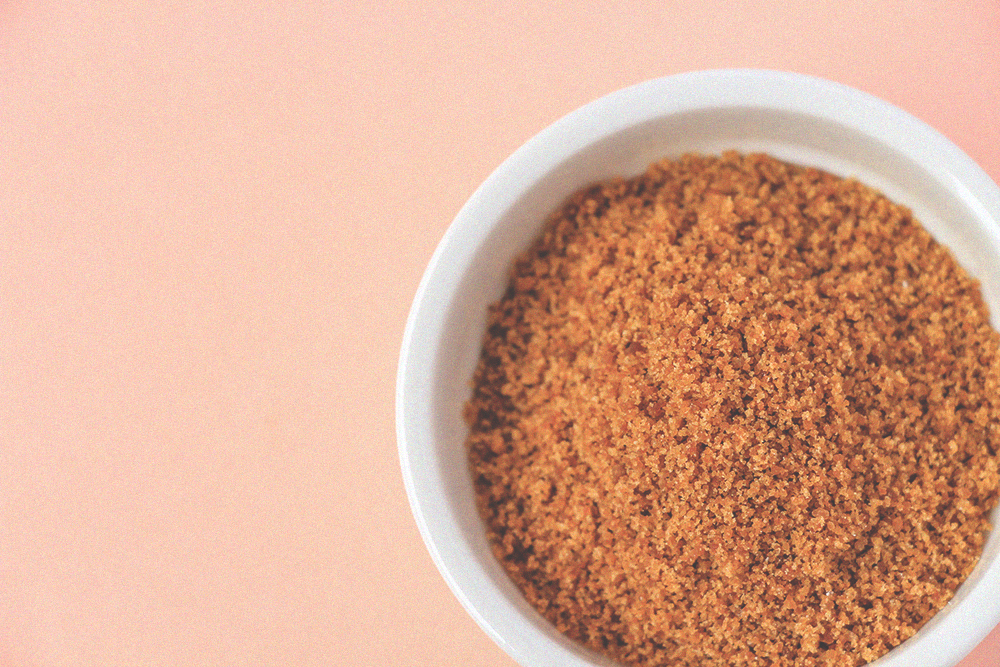What’s the deal with coconut sugar as the new “it” sweetener alternative? Let’s find out what the hype is all about.
BY: LINDSEY PINE, MS, RDN, CSSD, CLT
Coconut sugar isn’t anything new, but it sure is trending with a nice big health halo around it. This coarse, sandy sugar is often found in southeast Asian countries such as Thailand, Indonesia and the Philippines.
Coconut sugar isn’t actually made from the coconut itself. The sugar comes from the sap of blossoms found on the coconut tree, which is then heated until much of the water has evaporated. It has the look of wet sand from a Los Angeles beach and smells like graham crackers! Based on taste and look, the closest substitute is brown sugar…although I about fell over when I saw how much stores charge for this stuff.
$7 for a little bag of sugar?
Before we judge the price, let’s find out a more about how coconut sugar can be used and some of its claimed health benefits:
1. Can be used in baking.
The dark color can help turn your baked goods brown, so use in baked goods where you would use brown sugar.
2. It is supposedly low on the glycemic index.
(Glycemic index value, or GI, is how a carbohydrate ingredient raises blood sugar levels when measured against either white bread or glucose.)
The GI value of coconut sugar appears to range between 35-54, depending on the organization who tested it. The lower number on the range was reported by the Philippine Coconut Authority, while the higher number of 54 was reported by the official GI folks at the University of Sydney. The score of 54 reported by the more reputable organization is likely the most accurate. Since white sugar is in the 60-65 range, the difference is not all that significant between coconut sugar and white sugar.
The American Diabetes Association emphasizes that even if coconut sugar is lower on the Glycemic Index, it still contains about 15 calories and 4 grams of total carbohydrates per teaspoon…which is the same as white sugar.
3. It contains important minerals like potassium, magnesium, and phosphorous!
Does coconut sugar have enough of these minerals to make it a good source? Um, no way. You will never be told that you can replace fruits and veggies with coconut sugar. You’re not going to eat more sugar so you can get more minerals…it doesn’t work that way, folks! Eat your fruits and veggies.
4. Coconut sugar is more “natural”.
Some may say that coconut sugar isn’t as “processed” as white sugar and is more “natural”. Technically, there is no regulated definition of the term “natural”, so it can apply to anything really. That doesn’t make it any better, because sugar is sugar.
5. It contains inulin.
Inulin is a type of fiber with a sweet taste that is found in some plants. They are most often extracted from chicory root and used to cheaply bulk up the fiber content in a ton of processed products like cereals and granola bars.
While coconut sugar does contain some trace amounts of inulin, it’s not enough to make it a “health food”. Inulin and the minerals mentioned previously put coconut sugar in the category of slightly less bad than white sugar. Inulin is also highly fermentable in the gut, so if you have issues with gas and bloating, too much inulin may aggravate those symptoms.
6. Coconut sugar is a good option for vegans who avoid bulk cane sugar.
Interesting fact: much of the bulk cane sugar is whitened using animal bone char as a filter, which is why many vegans do not eat non-organic cane sugar. That’s why coconut sugar is a great alternative for those who are avoiding all animal-based products.
What’s the final verdict on coconut sugar? It’s still sugar and is by no means a health food. If you need to keep your dish vegan, coconut sugar is a good option. Enjoy it if you like the taste, but use sparingly in the same way you would with any other sugar product.
Adapted from the original article.
Lindsey Pine, MS, RDN, CSSD, CLT is a Los Angeles-based dietitian, specializing in food sensitivities and culinary creations. Whether she’s working with students at University of Southern California or in her private practice, Lindsey helps others find the healthy foods that they love so help sustain their long-term success. To find your tastiest balance in life, connect with Lindsey at Tasty Balance Nutrition.


Great post! I happen to like the flavor of coconut sugar, but as an RD, I know sugar is sugar no matter where it’s from. This touched on some comments I’ve heard myself, so thanks!